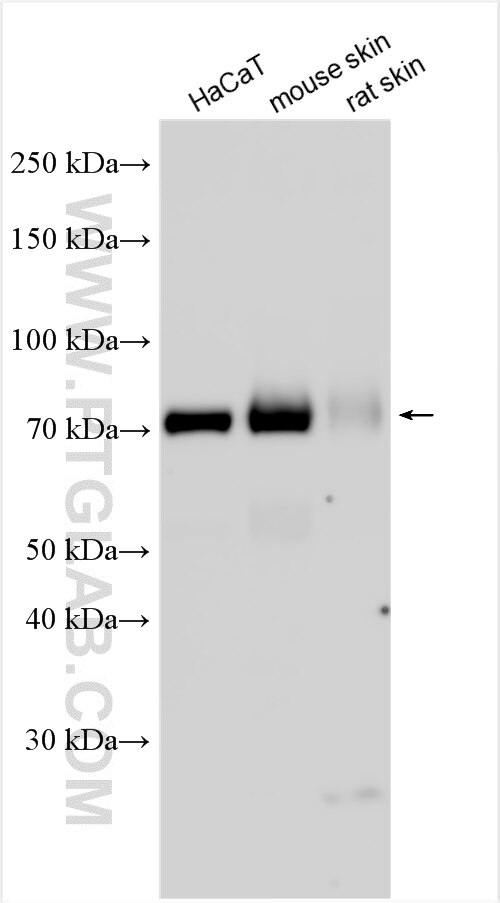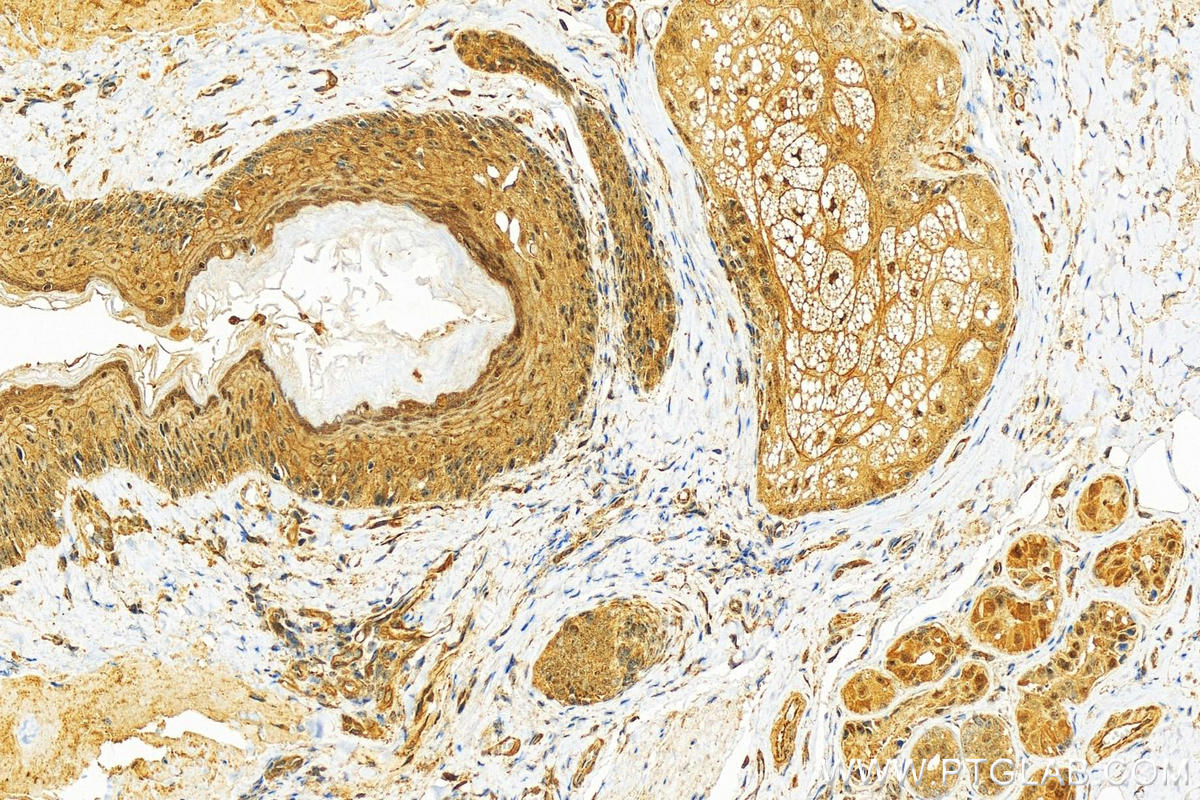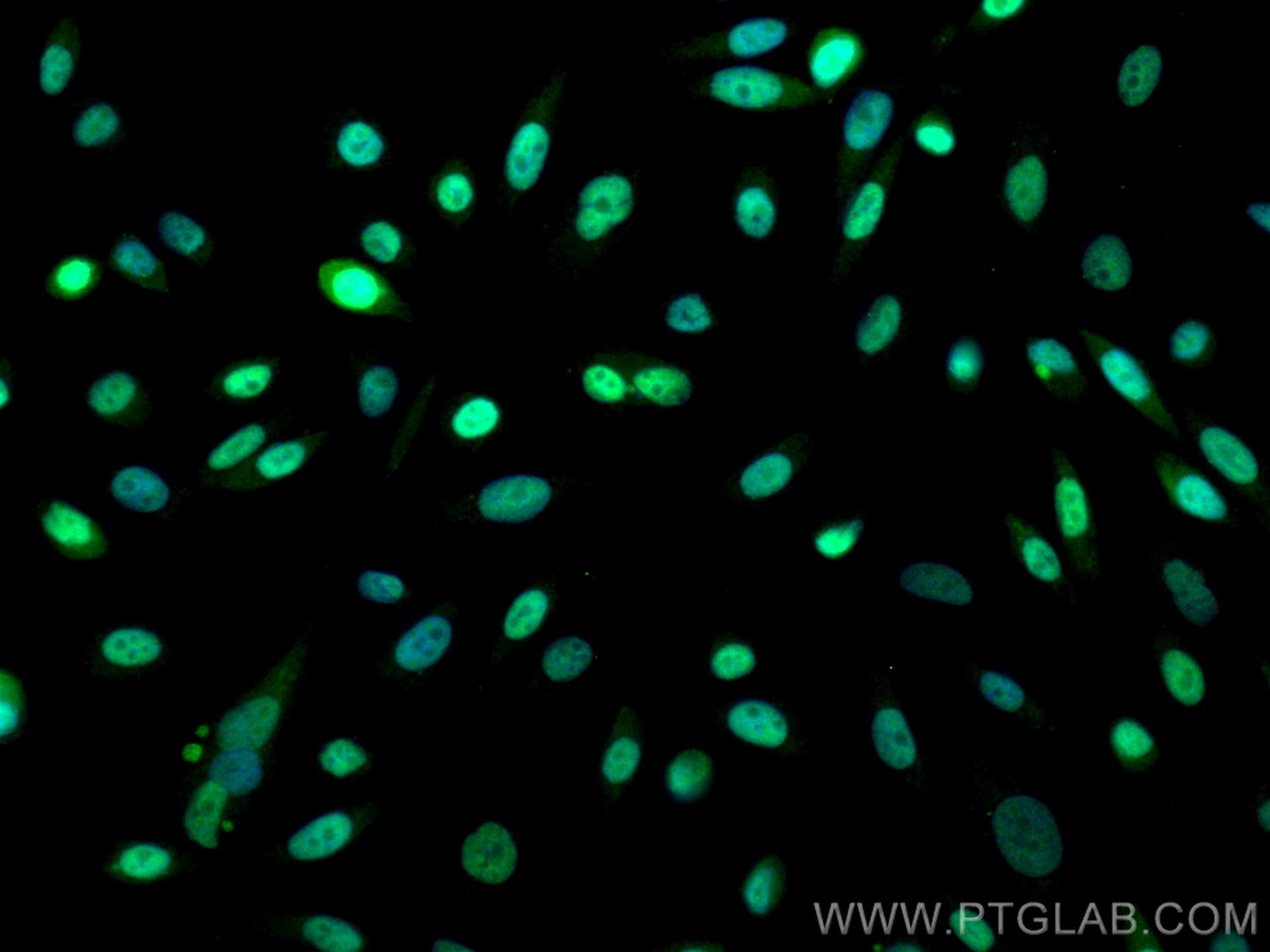Plakophilin 1 Polyklonaler Antikörper
Plakophilin 1 Polyklonal Antikörper für WB, IHC, IF/ICC, ELISA
Wirt / Isotyp
Kaninchen / IgG
Getestete Reaktivität
human, Maus, Ratte
Anwendung
WB, IHC, IF/ICC, ELISA
Konjugation
Unkonjugiert
Kat-Nr. : 22632-1-AP
Synonyme
Geprüfte Anwendungen
| Erfolgreiche Detektion in WB | HaCaT-Zellen, Maushautgewebe, Rattenhautgewebe |
| Erfolgreiche Detektion in IHC | humanes Hautkrebsgewebe Hinweis: Antigendemaskierung mit TE-Puffer pH 9,0 empfohlen. (*) Wahlweise kann die Antigendemaskierung auch mit Citratpuffer pH 6,0 erfolgen. |
| Erfolgreiche Detektion in IF/ICC | PC-3-Zellen |
Empfohlene Verdünnung
| Anwendung | Verdünnung |
|---|---|
| Western Blot (WB) | WB : 1:2000-1:12000 |
| Immunhistochemie (IHC) | IHC : 1:600-1:2400 |
| Immunfluoreszenz (IF)/ICC | IF/ICC : 1:200-1:800 |
| It is recommended that this reagent should be titrated in each testing system to obtain optimal results. | |
| Sample-dependent, check data in validation data gallery | |
Veröffentlichte Anwendungen
| WB | See 1 publications below |
| IHC | See 2 publications below |
Produktinformation
22632-1-AP bindet in WB, IHC, IF/ICC, ELISA Plakophilin 1 und zeigt Reaktivität mit human, Maus, Ratten
| Getestete Reaktivität | human, Maus, Ratte |
| In Publikationen genannte Reaktivität | human, Maus |
| Wirt / Isotyp | Kaninchen / IgG |
| Klonalität | Polyklonal |
| Typ | Antikörper |
| Immunogen | Plakophilin 1 fusion protein Ag18153 |
| Vollständiger Name | plakophilin 1 (ectodermal dysplasia/skin fragility syndrome) |
| Berechnetes Molekulargewicht | 747 aa, 83 kDa |
| Beobachtetes Molekulargewicht | 70-75 kDa |
| GenBank-Zugangsnummer | BC114571 |
| Gene symbol | PKP1 |
| Gene ID (NCBI) | 5317 |
| Konjugation | Unkonjugiert |
| Form | Liquid |
| Reinigungsmethode | Antigen-Affinitätsreinigung |
| Lagerungspuffer | PBS with 0.02% sodium azide and 50% glycerol |
| Lagerungsbedingungen | Bei -20°C lagern. Nach dem Versand ein Jahr lang stabil Aliquotieren ist bei -20oC Lagerung nicht notwendig. 20ul Größen enthalten 0,1% BSA. |
Hintergrundinformationen
Plakophilin 1, also known as PKP1, B6P, is a member of the arm-repeat protein family. PKP1 contains arm-repeat (armadillo) domains, localizes to nuclei and cell desmosomes, and participates in linking cadherins to intermediate filaments in the cytoskeleton (PMID: 10747098). PKP1 contributes to epidermal morphogenesis and facilitates the formation of intermediate filaments. Mutations in PKP1 have been associated with the ectodermal dysplasia/skin fragility syndrome (PubMed:9326952, 10852826).
Protokolle
| PRODUKTSPEZIFISCHE PROTOKOLLE | |
|---|---|
| WB protocol for Plakophilin 1 antibody 22632-1-AP | Protokoll herunterladen |
| IHC protocol for Plakophilin 1 antibody 22632-1-AP | Protokoll herunterladenl |
| IF protocol for Plakophilin 1 antibody 22632-1-AP | Protokoll herunterladen |
| STANDARD-PROTOKOLLE | |
|---|---|
| Klicken Sie hier, um unsere Standardprotokolle anzuzeigen |
Publikationen
| Species | Application | Title |
|---|---|---|
Adv Sci (Weinh) Excessive MYC Orchestrates Macrophages induced Chromatin Remodeling to Sustain Micropapillary-Patterned Malignancy in Lung Adenocarcinoma | ||
BMC Cancer Multi-omics analysis unveils a four-gene prognostic signature in esophageal squamous carcinoma and the therapeutic potential of PKP1 |




